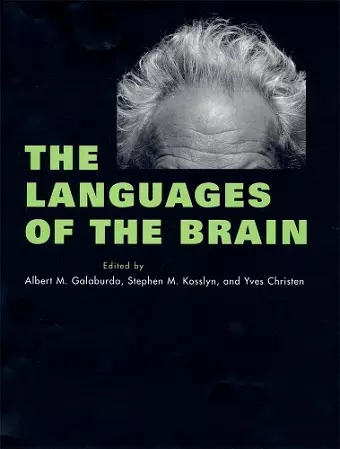The Languages of the Brain
Stephen M Kosslyn editor Yves Christen editor Albert M Galaburda editor
Format:Hardback
Publisher:Harvard University Press
Published:14th Jan '03
Currently unavailable, and unfortunately no date known when it will be back

This is an extremely useful book, one that will have wide appeal to an audience of cognitive scientists, neuroscientists, psychologists, philosophers, and possibly the growing number of humanities scholars interested in the interface of cognitive science and the arts. I can't think of any book that collects so many approaches to mental representation between one set of covers and that gathers together the latest work and thoughts of so many stellar researchers in cognitive science. The introductory chapter, moreover serves as an excellent survey and overview. -- Steven Pinker, Professor in the Department of Brain and Cognitive Sciences, Massachusetts Institute of Technology, and author of How the Mind Works
A stellar lineup of international cognitive scientists, philosophers, and artists make a case that the brain is multilingual. Among topics discussed are the learning of second languages, recovering language after brain damage, sign language, mental imagery, representations of motor activity, and the perception and representation of space.
The only way we can convey our thoughts in detail to another person is through verbal language. Does this imply that our thoughts ultimately rely on words? Is there only one way in which thoughts can occur? This ambitious book takes the contrary position, arguing that many possible "languages of thought" play different roles in the life of the mind.
"Language" is more than communication. It is also a means of representing information in both working and long-term memory. It provides a set of rules for combining and manipulating those representations.
A stellar lineup of international cognitive scientists, philosophers, and artists make the book's case that the brain is multilingual. Among topics discussed in the section on verbal languages are the learning of second languages, recovering language after brain damage, and sign language, and in the section on nonverbal languages, mental imagery, representations of motor activity, and the perception and representation of space.
This is an extremely useful book, one that will have wide appeal to an audience of cognitive scientists, neuroscientists, psychologists, philosophers, and possibly the growing number of humanities scholars interested in the interface of cognitive science and the arts. I can't think of any book that collects so many approaches to mental representation between one set of covers and that gathers together the latest work and thoughts of so many stellar researchers in cognitive science. The introductory chapter, moreover serves as an excellent survey and overview. -- Steven Pinker, Professor in the Department of Brain and Cognitive Sciences, Massachusetts Institute of Technology, and author of How the Mind Works
ISBN: 9780674007727
Dimensions: unknown
Weight: 812g
432 pages